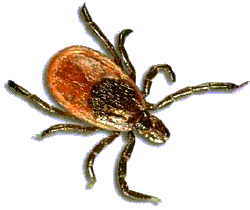|
As with
all serious and debilitating diseases, there are some factors that come
into play more than the disease itself which complicates things for the
patient and the family. These issues are sometimes more devastating than
the disease itself.
One of the biggest problems
with Lyme disease is that it can render the victim completely helpless
and unable to work or take care of the family. The disease can mimic other
diseases in combination such as Lou Gehrig's disease, rheumatoid arthritis,
multiple sclerosis, polymyalgia rheumatica, fibromyalgia syndrome, psoriatic
arthritis, Alzheimer's and lupus. It is painful and causes debilitating
fatigue and weakness to the point of paralysis at times. It can cause
seizures and Bell's palsy, meningitis and encephalitis. It can cause bone
pain and joint pain so severe that it can be frightening.
As with all severe disabling
diseases, this one carries with it a whole host of problems other than
the disease itself. The following are but a few:
Guilt. Feeling
bad about feeling bad particularly when one is unable to work or keep
up their share of the housework and child-rearing. This carries over into
marital relationships as well because although the Lyme person looks well
on the outside, often they feel as though they are dying on the inside.
It is hard when loved ones and friends want to go someplace and have a
good time and the Lyme patient wants to stay home due to fatigue or pain.
They oftentimes feel guilty for being such a dull partner.
The symptoms can also
lead to guilt surrounding the lack of sexual interest because the disease
is a neurologic disease and can cause some sexual problems as well.
Isolation/Desertion.
Often the Lyme patient has the sympathy of friends, physicians, and family
at first. But as the months pass and the years pass and the patient continues
to complain of varying symptoms and the blood test scans continue to come
back negative, friends and family pull away. They begin to doubt the sanity
of the person. The physicians begin blaming the patient and suggesting
emotional overlay, hysteria, depression or psychogenic problems. The family
follows suit.
This kind of abandonment
only makes things worse for the Lyme person. They not only have to deal
with chest pain, numbness, tingling, infections, fevers, dizziness, pain,
weakness, fatigue and memory loss, etc., but they have to do it with strange
looks, nasty comments and mistrust from the people who were at one time
close to them.
Validation of the
person. It is difficult to feel validated as a person when others
are telling you that you are nuts and that your symptoms do not exist
or that you are bringing them on yourself. Validation must be done now
more from within and one finds themselves in the dilemma of trying to
beef up their own self-esteem with positive affirmations. This is a time
when we all need to feel support and so often we feel just the opposite.
Employers accuse patients
of faking illness; family accuse them of not wanting to work or carry
out daily chores; friends accuse them of being hypochondriacs and no longer
being the kind of friend that they were in the past. Children worry if
it is their parent, and spouses become concerned as well.
Parents begin to doubt
the validity and the severity of the symptoms and the Lyme patient sinks
into depression, at last fulfilling the prophecy of the doctors who for
so long had suggested that to be the case in the first place.
Lyme is like having
symptoms of all the major diseases compiled into one. It can leave one
in quiet desperation. Lyme disease is an infection and an infection that
affects the brain. Adding insult to injury, the brain manifestations such
as subtle encephalitis and meningitis can cause patients to be emotionally
labile, or perhaps moody.
Most Lyme patients are
people whose lives have been filled with activity and outdoor things and
for the most part, these are people who lived life to its fullest and
suddenly were struck down. The adjustment is not easy.
There is fear of the
future and fear of the present. With concomitant brain inflammations and
central nervous system problems, it can cause a variety of emotional problems,
unlike anything the patient previously knew.
We are hoping that the
physicians in the midwest will stop and take a good look at what is really
going on here. We do have a problem and it is a problem that at some point,
must be addressed. Unfortunately I am finding more and more people who
have suffered with Lyme for over 6 years and it concerns me greatly.
It is my sincere hope
that soon each and every physician in Kansas City and the surrounding
areas will include Lyme in their differential diagnoses when symptoms
are suggestive of a combination of rheumatologic, neurologic or cardiac.
Lyme Disease is not
a benign disease. It is a very serious spirochetal disease which must
be treated with aggressive antibiotic therapy.
Lyme
activist Kathy Cavert has died since the writing of this article.
|
